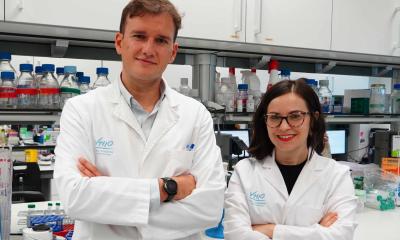Fitness
Metastatic prostate cancer: better monitoring with new liquid biopsy method

Our study shows that tumor mRNA encapsulated in circulating extracellular vesicles is protected and therefore represents a promising source of clinically relevant information
Irene Casanova
The investigators analyzed liquid biopsies—collected by plasma series sampling throughout the course of disease—of a retrospective cohort of 53 metastatic castration-resistant prostate cancer patients who received treatment with hormone therapy or chemotherapy. They studied DNA and RNA in circulating extracellular vesicles, results of which confirm that these vesicles contain tumor-derived genetic material that can help to identify specific mutations present in tumor cells and forecast the evolution of disease.
Using a newly developed liquid biopsy technique, findings demonstrate that DNA and RNA contained in circulating vesicles reflect the genomic and transcriptomic features in metastatic prostate cancer. Furthermore, results of mRNA expression analysis—performed for the first time in extracellular vesicles in liquid biopsies—enables the monitoring of on-therapy changes in these tumors. “The study of transcriptomic features by liquid biopsy in clinical samples has mostly been unsuccessful due to the rapid degradation of RNA when it is not shielded by the cell membrane. Our study shows that tumor mRNA encapsulated in circulating extracellular vesicles is protected and therefore represents a promising source of clinically relevant information,” adds Casanova.
Carried out in collaboration with colleagues at the Principe Felipe Research Institute (CIPF) in Valencia, and the Spanish National Cancer Research Center (CNIO), Madrid, Spain, the researchers have characterized the transcriptomic profile of these tumors that could serve as a biomarker of response or resistance to therapy. Their findings could also expand the opportunities to study cancer from minimally invasive liquid biopsies.
“Drug resistance remains a major challenge in more effectively treating cancer. Adaptive mechanisms of resistance occur more rapidly and dynamically than mutations driving acquired resistance. Monitoring these changes as they occur by liquid biopsy will enable real‐time clinical decision‐making and the selection of adaptive treatments to help combat evolving tumor dynamics earlier,” concludes Joaquin Mateo.
This work was funded by a ”la Caixa” Foundation Junior Leader Fellowship to Irene Casanova and a grant from the FERO Foundation and Ramon Areces Foundation to Joaquin Mateo. VHIO’s Prostate Cancer Translational Research Group is also supported by funding received from the CRIS Cancer Foundation.
Source: Vall d’Hebron Institute of Oncology










